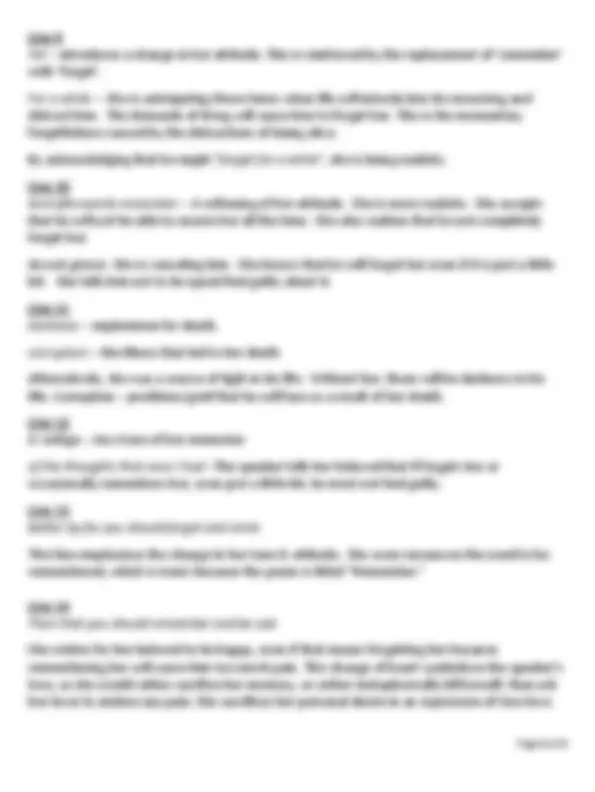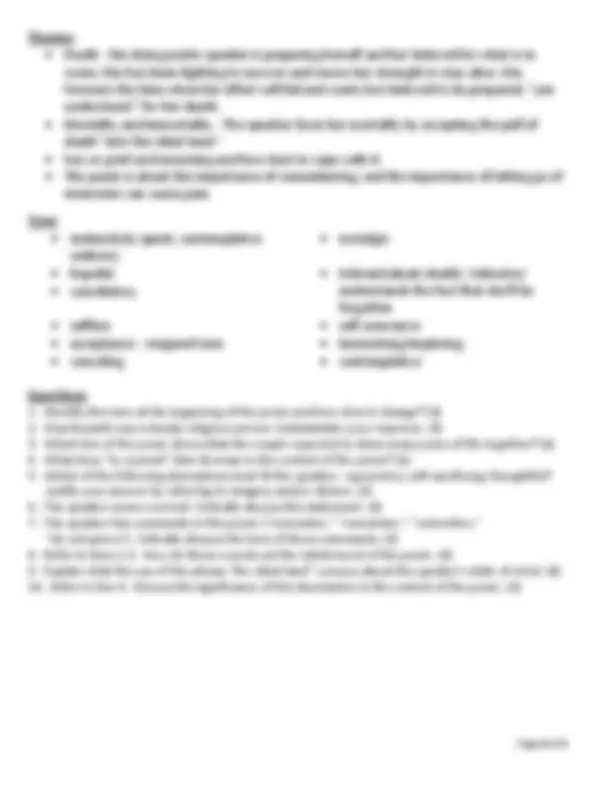




Study with the several resources on Docsity

Earn points by helping other students or get them with a premium plan


Prepare for your exams
Study with the several resources on Docsity

Earn points to download
Earn points by helping other students or get them with a premium plan
Community
Ask the community for help and clear up your study doubts
Discover the best universities in your country according to Docsity users
Free resources
Download our free guides on studying techniques, anxiety management strategies, and thesis advice from Docsity tutors
The speaker addresses her beloved and encourages him to remember her after her death. She asks him to remember her even when his memory of her begins to fade.
Typology: Lecture notes
1 / 4

This page cannot be seen from the preview
Don't miss anything!



Remember - CHRISTINA ROSSETTI Summary “Remember” is a Petrarchan sonnet. The speaker addresses her beloved and encourages him to remember her after her death. She asks him to remember her even when his memory of her begins to fade. Eventually, the speaker gives this person her permission to forget her gradually because it is better to "forget and smile" than to "remember and be sad."
The octave The speaker reminds her beloved that when she is gone into the silent land of death, he will no longer hold her hand; he will no longer plan or speak of their future life together (seemingly her illness has prevented them from marrying); he will no longer be able to comfort and counsel her and pray for her. Her request of him is that, with all this that they will lose, he remember her. The theme is being remembered after death. The speaker is self- centred: she is thinking only about herself.
The sestet The narrator’s tone changes in the sestet. The narrator even renounces the need to be remembered, which is ironic because the poem is titled “Remember.” She wishes for her beloved to be happy, even if that means forgetting her. The narrator sacrifices her personal desire in an expression of true love.
Repetition Rossetti repeats the word “remember” throughout the entire poem, as if the narrator fears that her beloved will not heed her request. She also uses repetition to emphasise the vast boundary between life and death, writing “gone away,” and later, “gone far away.”
Line 1 Remember me – commanding tone
when I am gone away – euphemism for death. She tries to soften the impact that she will be gone forever. This emphasizes the narrator's loneliness without her beloved rather, which is stronger than her fear of death itself.
Line 2 Gone far away – she will not be able to return. Sense of finality.
f ar – emphasises distance between them into the silent land - In Christianity, the phrase is a symbol for and an implied metaphor for death: going into the silent land is going into the land of death. After she dies, she will no longer be able to communicate with her beloved. Thus, the afterlife will be a " silent land ".
the - conveys a sense of certainty, no doubt that she is about to die. Silent – can mean peacefulness (Heaven). She will be at peace because she will no longer suffer any pain.
Line 3 When you can no more hold me by the hand – She has accepted that she is going to die. She is telling her beloved to still remember her even when she will not be physically present. This physical representation of love will be impossible once she is dead. This emphasises her fear that he will forget her.
holding hands – This is a symbol of love.
Line 4 This line reflects her indecision. She knows that she does not have any control over death. She accepts that she is going to die (half turn to go ). She is on the brink of death. However, she wants to spend as much time as possible with her beloved because of her love for him ( yet turning stay) – she cannot choose between dying or being with her beloved. She. Unlike any other journey, she cannot turn back.
Line 5 Remember me – She reminds him to remember her. This conveys her anxiety that he must not forget her.
when no more – euphemism for death
day by day – emphasises that he must remember her every day/ all the time.
Line 6 You tell me of our future that you planned – The couple anticipated that they would share a future together, but this was not to be. The speaker succumbed to some disease or “corruption” (line 11) that eventually led to her death. This future no longer exists. This conveys a sense of permanent loss.
you planned – Women in Victorian England were expected to be dominated by the man. This does not necessarily mean that that she had no say in the planning.
Line 7 Only remember me – This line emphasises the speaker’s fear that her beloved will forget her. She has a pleading that he does not forget her. She does not want a short- term mourning period, with fancy gestures. She desperately wants an assurance that he will not forget her.
Line 8 counsel – advise. Prayers and counsel are needed when she is alive. They will be useless after she is dead. Neither prayer s nor advise ( counsel) could prevent her death. She believed that after death the spiritual fate of the departed is sealed and cannot be changed.
Themes
Tone
Questions